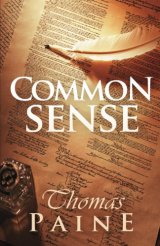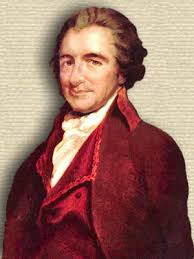Common Sense Page #11
Common Sense is a pamphlet written by Thomas Paine in 1775–1776 advocating independence from Great Britain to people in the Thirteen Colonies. Writing in clear and persuasive prose, Paine marshaled moral and political arguments to encourage common people in the Colonies to fight for egalitarian government.
O ye that love mankind! Ye that dare oppose, not only the tyranny, but the tyrant, stand forth! Every spot of the old world is overrun with oppression. Freedom hath been hunted round the globe. Asia, and Africa, have long expelled her--Europe regards her like a stranger, and England hath given her warning to depart. O! receive the fugitive, and prepare in time an asylum for mankind. OF THE PRESENT ABILITY OF AMERICA, WITH SOME MISCELLANEOUS REFLEXIONS. I have never met with a man, either in England or America, who hath not confessed his opinion, that a separation between the countries, would take place one time or other: And there is no instance, in which we have shewn less judgment, than in endeavouring to describe, what we call, the ripeness or fitness of the Continent for independance. As all men allow the measure, and vary only in their opinion of the time, let us, in order to remove mistakes, take a general survey of things, and endeavour, if possible, to find out the very time. But we need not go far, the inquiry ceases at once, for, the time hath found us. The general concurrence, the glorious union of all things prove the fact. It is not in numbers, but in unity, that our great strength lies; yet our present numbers are sufficient to repel the force of all the world. The Continent hath, at this time, the largest body of armed and disciplined men of any power under Heaven; and is just arrived at that pitch of strength, in which no single colony is able to support itself, and the whole, when united, can accomplish the matter, and either more, or, less than this, might be fatal in its effects. Our land force is already sufficient, and as to naval affairs, we cannot be insensible, that Britain would never suffer an American man of war to be built, while the continent remained in her hands. Wherefore, we should be no forwarder an hundred years hence in that branch, than we are now; but the truth is, we should be less so, because the timber of the country is every day diminishing, and that, which will remain at last, will be far off and difficult to procure. Were the continent crowded with inhabitants, her sufferings under the present circumstances would be intolerable. The more sea port towns we had, the more should we have both to defend and to lose. Our present numbers are so happily proportioned to our wants, that no man need be idle. The diminution of trade affords an army, and the necessities of an army create a new trade. Debts we have none; and whatever we may contract on this account will serve as a glorious memento of our virtue. Can we but leave posterity with a settled form of government, an independant constitution of its own, the purchase at any price will be cheap. But to expend millions for the sake of getting a few vile acts repealed, and routing the present ministry only, is unworthy the charge, and is using posterity with the utmost cruelty; because it is leaving them the great work to do, and a debt upon their backs, from which they derive no advantage. Such a thought is unworthy a man of honor, and is the true characteristic of a narrow heart and a pedling politician. The debt we may contract doth not deserve our regard if the work be but accomplished. No nation ought to be without a debt. A national debt is a national bond; and when it bears no interest, is in no case a grievance. Britain is oppressed with a debt of upwards of one hundred and forty millions sterling, for which she pays upwards of four millions interest. And as a compensation for her debt, she has a large navy; America is without a debt, and without a navy; yet for the twentieth part of the English national debt, could have a navy as large again. The navy of England is not worth, at this time, more than three millions and an half sterling. The first and second editions of this pamphlet were published without the following calculations, which are now given as a proof that the above estimation of the navy is just. See Entic's naval history, intro. page 56. The charge of building a ship of each rate, and furnishing her with masts, yards, sails and rigging, together with a proportion of eight months boatswain's and carpenter's sea-stores, as calculated by Mr. Burchett, Secretary to the navy. £ [pounds sterling] For a ship of 100 guns = 35,553 90 = 29,886 80 = 23,638 70 = 17,785 60 = 14,197 50 = 10,606 40 = 7,558 30 = 5,846 20 = 3,710 And from hence it is easy to sum up the value, or cost rather, of the whole British navy, which in the year 1757, when it was at its greatest glory consisted of the following ships and guns: Ships. Guns. Cost of one. Cost of all. Cost in £ [pounds sterling] 6 100 35,553 213,318 12 90 29,886 358,632 12 80 23,638 283,656 43 70 17,785 764,755 35 60 14,197 496,895 40 50 10,606 424,240 45 40 7,558 340,110 58 20 3,710 215,180 85 Sloops, bombs and fireships, one with another, at } 2,000 170,000 ------------ Cost 3,266,786 Remains for Guns 233,214 ------------ 3,500,000 No country on the globe is so happily situated, or so internally capable of raising a fleet as America. Tar, timber, iron, and cordage are her natural produce. We need go abroad for nothing. Whereas the Dutch, who make large profits by hiring out their ships of war to the Spaniards and Portuguese, are obliged to import most of the materials they use. We ought to view the building a fleet as an article of commerce, it being the natural manufactory of this country. It is the best money we can lay out. A navy when finished is worth more than it cost. And is that nice point in national policy, in which commerce and protection are united. Let us build; if we want them not, we can sell; and by that means replace our paper currency with ready gold and silver. In point of manning a fleet, people in general run into great errors; it is not necessary that one fourth part should be sailors. The Terrible privateer, Captain Death, stood the hottest engagement of any ship last war, yet had not twenty sailors on board, though her complement of men was upwards of two hundred. A few able and social sailors will soon instruct a sufficient number of active landmen in the common work of a ship. Wherefore, we never can be more capable to begin on maritime matters than now, while our timber is standing, our fisheries blocked up, and our sailors and shipwrights out of employ. Men of war, of seventy and eighty guns were built forty years ago in New-England, and why not the same now? Ship-building is America's greatest pride, and in which, she will in time excel the whole world. The great empires of the east are mostly inland, and consequently excluded from the possibility of rivalling her. Africa is in a state of barbarism; and no power in Europe, hath either such an extent of coast, or such an internal supply of materials. Where nature hath given the one, she has withheld the other; to America only hath she been liberal of both. The vast empire of Russia is almost shut out from the sea; wherefore, her boundless forests, her tar, iron, and cordage are only articles of commerce.
Translation
Translate and read this book in other languages:
Select another language:
- - Select -
- 简体中文 (Chinese - Simplified)
- 繁體中文 (Chinese - Traditional)
- Español (Spanish)
- Esperanto (Esperanto)
- 日本語 (Japanese)
- Português (Portuguese)
- Deutsch (German)
- العربية (Arabic)
- Français (French)
- Русский (Russian)
- ಕನ್ನಡ (Kannada)
- 한국어 (Korean)
- עברית (Hebrew)
- Gaeilge (Irish)
- Українська (Ukrainian)
- اردو (Urdu)
- Magyar (Hungarian)
- मानक हिन्दी (Hindi)
- Indonesia (Indonesian)
- Italiano (Italian)
- தமிழ் (Tamil)
- Türkçe (Turkish)
- తెలుగు (Telugu)
- ภาษาไทย (Thai)
- Tiếng Việt (Vietnamese)
- Čeština (Czech)
- Polski (Polish)
- Bahasa Indonesia (Indonesian)
- Românește (Romanian)
- Nederlands (Dutch)
- Ελληνικά (Greek)
- Latinum (Latin)
- Svenska (Swedish)
- Dansk (Danish)
- Suomi (Finnish)
- فارسی (Persian)
- ייִדיש (Yiddish)
- հայերեն (Armenian)
- Norsk (Norwegian)
- English (English)
Citation
Use the citation below to add this book to your bibliography:
Style:MLAChicagoAPA
"Common Sense Books." Literature.com. STANDS4 LLC, 2024. Web. 25 Nov. 2024. <https://www.literature.com/book/common_sense_270>.




Discuss this Common Sense book with the community:
Report Comment
We're doing our best to make sure our content is useful, accurate and safe.
If by any chance you spot an inappropriate comment while navigating through our website please use this form to let us know, and we'll take care of it shortly.
Attachment
You need to be logged in to favorite.
Log In